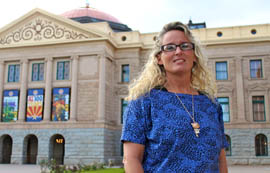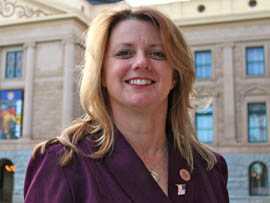Cronkite News has moved to a new home at cronkitenews.azpbs.org. Use this site to search archives from 2011 to May 2015. You can search the new site for current stories.
Lawmaker: Make schools get parental consent to use isolation rooms
PHOENIX – When Leslie Noyes stopped by her son’s Glendale elementary school last year, she said she found him lying face-down on the floor of an enclosed, 5-by-5-foot structure in the back of the special education classroom.
Noyes said she had no idea the school had been regularly putting the 7-year-old in what’s commonly referred to as an isolation or seclusion room in response to his behavior issues.
“Finally I was able to carry him out of the room and it was like, ‘What is this? Why don’t I know about this?’” she said.
A state lawmaker said she wants to spare other parents from being surprised to learn that a school is using isolation rooms to address student behavior.
HB 2476, authored by Rep. Kelly Townsend, R-Mesa, would require schools to obtain parental consent before using isolation or seclusion rooms.
“I think it’s quite reasonable,” Townsend said. “I can’t imagine anyone saying that we need to keep it secret.”
The Senate Education Committee endorsed the bill on Monday, Feb. 11, after hearing testimony from Noyes, who along with her husband has a lawsuit pending against the Deer Valley Unified School District.
A district spokeswoman didn’t return phone messages left Friday.
The committee amended Townsend’s bill to add an exemption for instances in which principals or teachers determine that students pose an imminent threat of physical harm to themselves or others.
A 2010 report by the U.S. Department of Education listed Arizona as one of 19 states without laws regulating the use of restraints and seclusion in schools.
A task force created by a 2009 state law provided Arizona schools with a list of recommendations on the use of seclusion and restraint of special education students. Schools weren’t required to follow the recommendations or keep records of how and when isolation rooms are used.
Those recommendations didn’t address seclusion or isolation as punishment for the general student population.
Staci Burk, president of Gilbert Public Schools Governing Board, said HB 2476 wouldn’t burden schools.
“It will help us identify parents that may oppose the use of seclusion rooms and therefore maybe help with legally protecting the district by engaging the parents in dialogue,” Burke told the Senate committee.
She said the Gilbert district would prefer to have uniform regulation across the state, calling isolation rooms and seclusion of students too complex to be handled locally.
Janice Palmer, director of government relations for the Arizona School Boards Association, said it’s important to separate isolation used to punish students from isolation and seclusion used in behavior programs for students with special needs.
“This is such a complex issue, we don’t want to have any confusion between seclusion, restraint and the special ed world and isolation as it relates to the general population,” she said.
Hope Kirsh, the special education attorney who filed the Noyes’ lawsuit, said though she doesn’t condone the use of the rooms, she supports the bill as a “legislative pronouncement on parental consent.”
“There is nothing positive to be gained from this punitive measure,” she said.
Melissa Van Hook, representing the East Valley Autism Network, called the existing recommendations “a failure of local control.” Van Hook, a mother of two autistic sons, said though the bill might help she’d prefer to see isolation rooms banned.
“This is a step in the right direction; however, it is inadequate,” she said.








